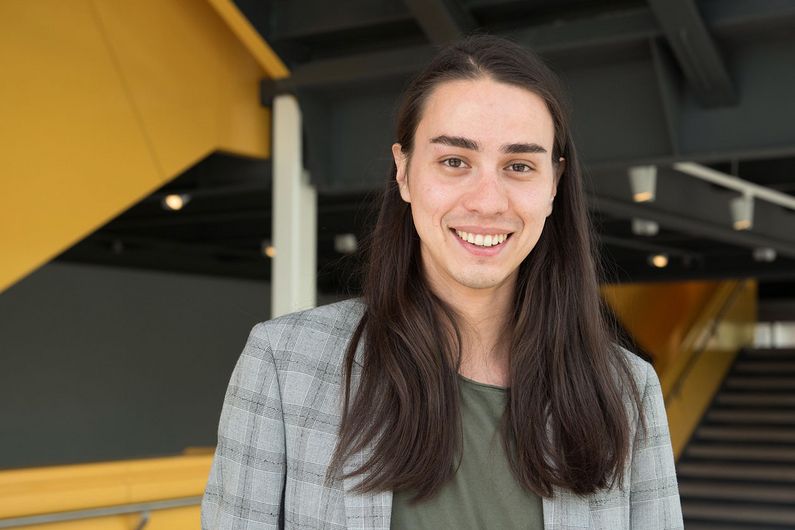Three questions for Samuel Rainville
- UdeMNouvelles
09/12/2019
- Martin LaSalle
He thought his destiny was to do humanitarian work abroad, but now the young Innu from Pessamit is UdeM's new aboriginal student liaison officer.
A year ago, when he left Quebec City to settle in Montreal, Samuel Rainville wasn't looking for the job of his dreams. But when he saw the posting at Université de Montréal, he knew: it was exactly what he wanted to do.
For nearly five months now, Rainville, an Innu from Pessamit, has been busy as the university's new aboriginal student liaison officer. Employed by Student Services, he's responsible, among other things, for an innovative project called Salon Uatik.
Created five years ago, the initiative helps aboriginal students at UdeM develop their own network, helping them navigate the many diverse activities available on campus and develop their abilities throughout their studies.
Rainville took time out on National Aboriginal Peoples' Day, celebrated since 1996 on June 21, to tell us about his role and aspirations in his new position. The day is significant: not only does it mark the unique heritage, cultural diversity and achievements of First Nations, Inuit and Métis people, it's also the summer solstice, the longest day of the year, important in aboriginal culture.
What motivated you to become a liaison officer in support of the aboriginal student community?
I have always been interested in international development and humanitarian aid, and I completed my bachelor's degree in international studies and modern languages at Laval University.
After my studies, my goal was to work internationally and one day, before I went abroad, my mother told me: "You don't need to go around the world to help others; we also need help here."
Her words stayed in my head!
When I came back, I told myself that I could indeed help here in Quebec. I turned to my origins with the desire to help members of aboriginal communities, to propel initiatives by First Nations.
There is much to be done in our aboriginal communities, where dropping out of school is a major problem. Many First Nations youth do not succeed in obtaining a high school diploma. Fortunately, though, more and more aboriginal people are going to university.
What role do you play in this respect and what do you want to accomplish?
Essentially, I coordinate the activities of Salon Uatik – 'uatik' means den, in Innu. It is the meeting place for the aboriginal student community. One thing I do, for example, is invite aboriginal speakers.
I also organize cultural activities, such as the 5th edition of MITIG, UdeM's Indigenous Cultural Week, which will take place this year from Sept. 9 to 13, with a special activity to mark the equinox on Sept. 23.
I also support all UdeM aboriginal students who need it, and I ensure that they have access to the university's various academic support services.
Finally, I want to foster strong ties among members of the aboriginal student community, and show that the university is a place where students can proudly assert themselves as aboriginal people.
What is the daily reality of UdeM's indigenous students?
One of the first mandates I was given was to produce a portrait of the aboriginal student population here. Overall, UdeM welcomed about 50 aboriginal students during the fall 2018 and winter 2019 semesters. They come mainly from the Innu, Atikamekw, Cree, Mi'kmaq, Squamish, Anishinabeg, Abenaki and Inuit nations.
However, it is an incomplete picture: students can identify themselves as belonging to one of the First Nations, but it is not mandatory to do, and not everyone necessarily wants to be identified as aboriginal.
It goes without saying that the profile of each student is different from one First Nation to another. Nevertheless, there are sometimes different realities between those from urban areas and those from the regions. Sometimes it is more difficult for them to integrate and adapt at the beginning: it is a big challenge for some to leave their community and then be exposed to difference.
At the same time, non-native students also have a role to play in the integration of their aboriginal colleagues. The first thing is to learn about First Nations, because there are many myths and stereotypes to deconstruct. To become their ally, the first step is to take an interest in their cultures, to try to understand where they come from.
There is still much to be done in the overall process of reconciliation, but Université de Montréal has achieved several successes in this regard:
- the declaration of recognition of the aboriginal territories on which Université de Montréal is built, which is read at the beginning of institutional activities such as graduation ceremonies;
- Uatik Salon, opened nearly five years ago, is also one of the greatest initiatives because it allows students to have a place where they can meet colleagues with similar experiences;
- new admissions forms that will integrate Quebec's 11 native mother tongues this fall;
- the Innu language courses given at the Language Centre of the Faculty of Arts and Science, which are increasingly successful;
- and, finally, a brand new website called Place aux Premiers Peuples, a global portal into all things aboriginal on campus.
I would also like to share with members of Quebec's aboriginal communities the fact that Université de Montréal can be an interesting option for them – in an inclusive environment, it allows them to pursue their studies in a way that respects their reality.













